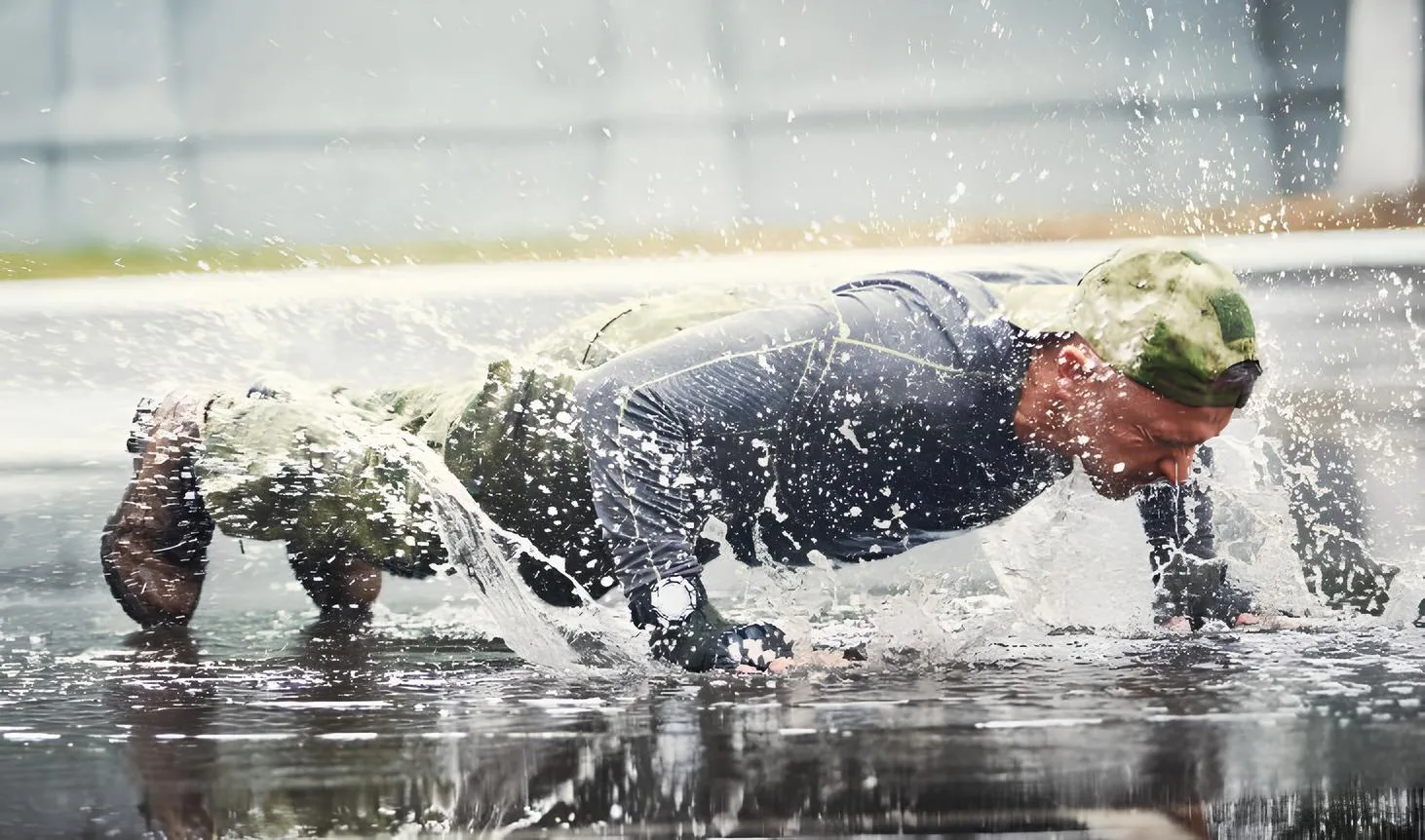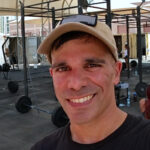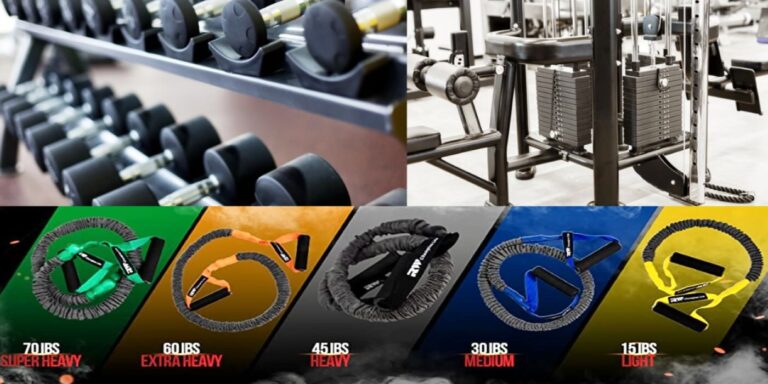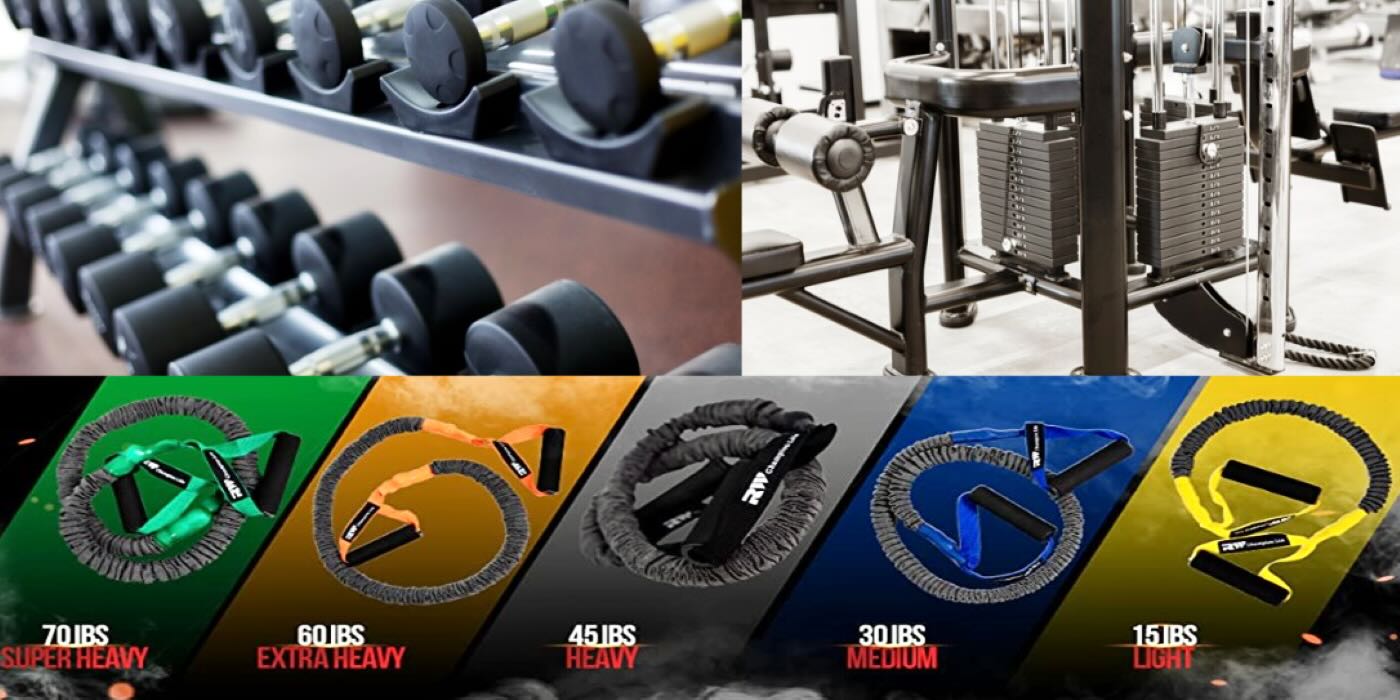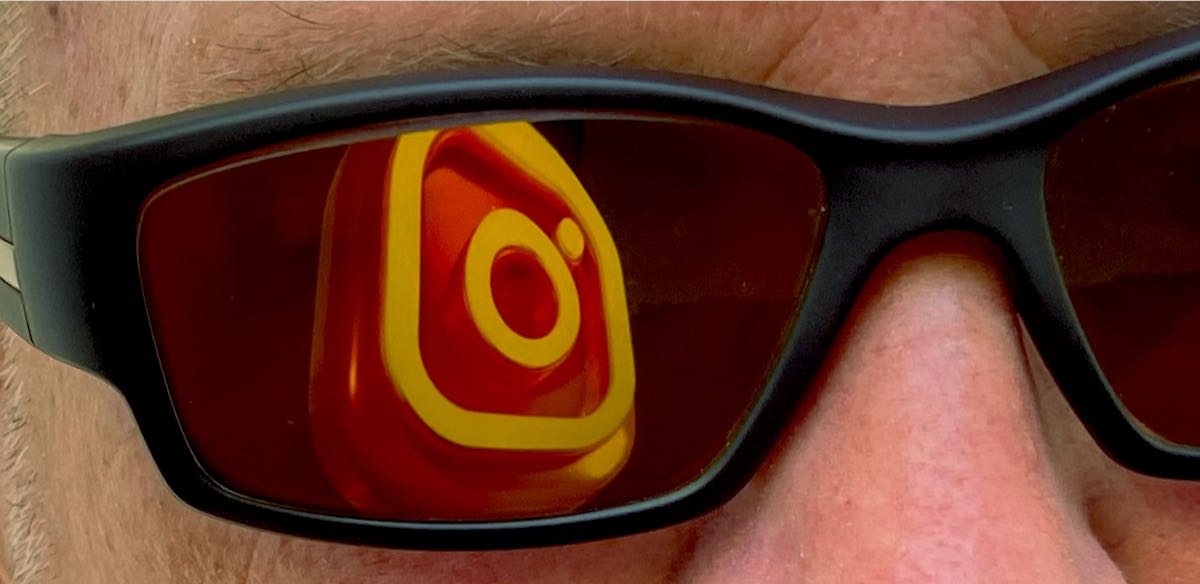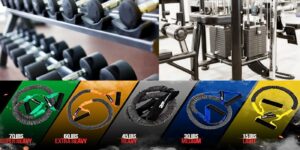My monthly BLOG post focuses on TACTICAL HUMAN PERFORMANCE TRAINING (physical, mental, spiritual, and social fitness) training for military, law enforcement, and fire/rescue professionals with the idea of being “fit for the fight and life” with mission performance at work and in life as the metric vs. gym numbers as the measuring strick of health. As part of this concept, this blog post will highlight topics related to GARAGE GYM CHURCH which is a concept I developed to turn your garage gym or workplace functional fitness facility a place where you not only workout, but a space where you can grow spiritually and connect with others from a Christian standpoint with an emphasis on the warrior lifestyle.- Chris Reardon, Founder/Executive Director of Freedom Fitness America “Tactical Human Performance for the 21st Century”, Major, US Marine Corps, US Naval Academy Class of 2007
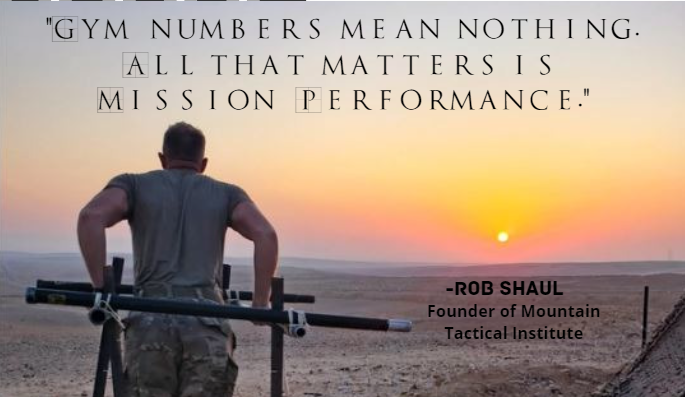
“’Fitness’ is a commonly used word in our society today but within the military, it has a particularly deep meaning. Conventionally, being fit means being adapted to a particular condition or circumstance. In war, militaries and their individual combatants must adapt to the chaos and complexities of battle. As these militaries return from war, they must maintain a state of vigilance while also peacefully coexisting within the civil society that produced them. ” Admiral McMullen, USN (Ret)
Tactical Human Performance Overview
The idea of total force fitness is where military members are charged with not just staying in top-notch physical health, but also in all areas of their life and career. This has been espoused for some time now especially considering high divorce rates, substance abuse, sexual assaults, suffering from post-traumatic stress, suicide, financial struggles, and other negative behaviors. What are the holistic components of this type of fitness to train professionals to perform with excellence on the battlefield AND in life? What does it take to successfully prepare warriors to go downrange to pull triggers and come back whole? For this post, I will share with you a perspective on what this can practically look like with a focus on individual attributes necessary to build the physical, mental, and spiritual fitness that are necessary for warriors to succeed on the battlefield and in life.
“Gym Numbers Mean Nothing. All That Matters is Mission Performance” Rob Shaul, Mountain Tactical Institute, Former US Coast Guard Officer
Human performance for tactical professionals from a physical fitness standpoint starts with the baseline idea that their bodies are their primary weapon system or operational platform. If they are unfit or injured then they are a liability and not able to contribute to the mission.
In other words, it’s great if you can beat everybody in a competition in a sporting event, lift like a beast, crush CrossFit Metcons, win endurance events, etc. But at the end of the day those trained to be on the front lines whether overseas or in the community must stay in top-notch physical condition because when it is time to whoop it on, they can’t afford to be out of shape. While the idea of the police officer wolfing down donuts is funny, in practice, if you are in trouble, you don’t want the cop showing up who is winded after a short distance who cannot help catch the bad guy, the firefighter who is too slow to pull a small child from a burning building, or the military professional who needs to carry their friend who is now a casualty off the battlefield to safety. Tactical professionals need to be able to perform physically to whatever the mission will demand of them. Tactical professionals aren’t NFL/NBA/MBL players but they are certainly professional athletes who must be in it to win it. Their livelihood depends on their fitness, but more importantly, their performance in dangerous operational environments and ability to survive along with fellow unit members who are counting on them is most critical. If military members don’t hold the line with their fitness, they very well can let their team down at critical times which can mean mission failure, serious injury, or even God forbid death to themselves or their teammates. Their physical fitness is literally life or death. My brother is a firefighter in CT and he expressed to me once his own lament of not being in the best shape he needed to be after watching another firefighter at a similar age in his 30s who died in a fire. My brother’s eyes were open to the reality that he needed to be on his physical “A” game or risk being too slow to maneuver in unforgiving structure fires for example.
So what are the main attributes of solid physical performance in a military unit? There are four main attributes that can be summed up as the capacity to endure, be agile, possess strength, and maintain flexibility. According to an article in Military Medicine, these definitions can be summed up as follows:
Endurance: Physically repeat the same task in a repetitive manner (Ex. Long Ruck March)
Agility/Mobility: Capability to move through time and space with precision to negotiate an obstacle (Ex. Scale a Wall).
Strength: Ability to generate force to overcome resistance (Ex: Drag a casualty.)
Flexibility: Achieve an optimal range of motion (Ex. Climbing in a vehicle, boat, or aircraft)
Fitness programs for tactical professionals need to focus on specific tasks necessary for mission accomplishment first and foremost for similar tasks they might find in their real-world missions. For example, let’s say a fire team needs to patrol the streets of an urban center with a heavy combat load followed by a sprint through a congested marketplace ultimately leading to kicking down a door and getting rifles steady and ready to fire. All of these tasks require different levels of physical fitness. The warriors in this scenario must have aerobic endurance to walk the patrol with their combat gear. They must have the anaerobic capability to sprint and mobility to quickly negotiate obstacles in the marketplace. Kicking in the door requires strength. Failure to accomplish any of these sub-tasks of the mission puts the military professional in danger and could lead to death along with the members of his or her team. A secondary sub-purpose to having a high state of physical fitness is to increase the front-line professional’s medical health, mental fitness, and ability to resist injury. Thus suboptimal or poor physical fitness is much more serious than in competitive athletics and thus should be emphasized. (Military Medicine, Volume 175, Aug 2010, pg. 15)
To further build on a state of physical fitness, nutrition must also be part of the conversation as well. The Military Medical Journal states, “Proper nutrition prevents illness, improves health, and optimizes emotional, cognitive, and physical capabilities. Food confers these benefits by providing the macro-and micronutrients to protect against disease, support injury-healing processes, and fuel immediate bioenergetic, emotional, and spiritual needs. Yet how (e.g. fast or slow), when, and where (e.g. alone or in a group) an individual consumes a particular meal can impact warrior fitness independent of the foodstuffs consumed.” Furthermore, the journal goes on to state: “Even with proper food that is readily available, optimal nutritional fitness will not be achieved unless warriors make healthy food choices.” (Military Medicine, Volume 175, Aug 2010, pg. 65) So we can see that BOTH the right type of exercise and nutrition along with other metrics of physical health including injury prevention practices, promotion of healthy sleep practices, hygiene, etc. are necessary to optimizing physical fitness in military professionals in order to promote a high chance of mission success and to the max extent possible prevent injury, death, and illness.
Mental Toughness
Now let’s talk about the mindset needed to fuel the physical performance of tactical athletes. The speed and complexity of military operations necessitate processing and filtering volumes of information and tasks, negotiating ambiguity in mission objectives and roles, the ability to make well-informed decisive decisions, and the ability to learn on the fly. The capacity to do so is vital to cumulative contributions to offensive combat power and force protection. This capacity is the sum total of the mental, emotional, and behavioral capabilities of a service member to stay cool under pressure and think and act in high-pressure situations for sustained periods of time. Military professionals train to this by providing physically stressful situations in training and then forcing the service member to perform difficult mental tasks to simulate what thinking under stress really looks like. This has been done with sailors who need to fight a ship fire or patch holes with water flooding a compartment; snipers needing to use the “Kim’s Game” model of memorizing cards, or special forces members needing to perform complex mental tasks like calling in an airstrike right after a long grueling endurance event. That being said, the ability to maintain a coolness under pressure and make sound moral decisions requires the next phase of fitness which is spiritual and this is one of the most important aspects of fitness because it deals with the heart, character, and our will which ultimately leads to our behaviors in life.
Spiritual Toughness
Tactical professionals must have a strong heart and spirit if they are going to face the realities of downrange operations with bravery and come back whole or even face death and injury with courage. If they don’t spend time honing this aspect of their training, then at the crucial time, it will not be there for them which can lead to operational failures and/or personal failures long after tactical operations are complete. It is also important that they understand how to live life with meaning and purpose so that they can be more resistant to depression and not be swayed to partake in fleeting but destructive pleasures such as overindulgence in alcohol. It is also important that they are ready to face danger, fear, exhaustion, hardship, and ultimately stare death in the face without blinking in a manner that will prove to be decisive in training and combat. From a Christian perspective, Christians are exhorted to share in suffering like a good soldier of Christ Jesus” (2 Timothy 2:3), and Jesus of Nazareth even mentions the need for Christian disciples to prepare for their own death to achieve victory over evil over attempting to save their lives and “to not fear those who can kill the body and afterward do no more but to instead fear the One who can destroy both the body and soul in hell” (Matthew 10:28).” Throughout the Bible, soldiers for national causes such as the ancient Hebrews facing foreign adversaries hell-bent on their destruction or soldiers for spiritual causes are exhorted to not let fear control them and instead be courageous. This courage comes from a conviction that “what we do in this life echoes in eternity” and it is better to stand for a righteous cause even if it means you lose your physical life. While there are many non-Christians who have died in history for various causes including that of political freedom such as many US service members fight for, I can speak for myself as a Christian who serves in the US Marine Corps that I am ready to face what comes because I know who has called me to my work and who ultimately holds my life in His hands. I know that because I have given my heart, mind, and soul to Jesus I have eternal life in me and do not need to be afraid of death. Spiritual resilience for warriors also means that there is a need to instill in them soul resilience to moral injuries such as feeling false guilt after a righteous kill on the battlefield. Many years ago I came to faith in Christ because I went to a Marine Corps Captain at the US Naval Academy to discuss the concept of killing vs. murder. I struggled with the thought that my military service would involve me taking human life and I didn’t know if God was ok with this. I came to learn that from a Romans 13 perspective along with other scriptures that there is a moral responsibility for government authorities to physically restrain evil through the use of violent force and if I’m serving in that capacity or am defending others in a violent struggle, then God holds my actions righteously. That being said, soldiers can still commit murder and in fact, we see this in the Bible where the nation of Israel is under the judgment of a famine because King Saul was overzealous and wiped out Gibeonites that indeed were supposed to be under the protection of Israel. (2 Samuel 21)
Spiritual fitness is often overlooked or downplayed, and yet may be the most important of all in terms of tying together holistically the health attributes of a warrior as an ancient proverb from the ancient Hebrew King Solomon warns “keep a vigilant watch over your heart; that’s where life starts.” (Proverbs 4:23 (MSG)) In a blog post recently written about GySgt John Basilone, a WWII Marine Medal of Honor and Navy Cross recipient who is an undisputed historical legend of the battlefield, especially among US Marines, it is interesting to note how John Basilone didn’t just train his Marines in machine gun tactics. He understood there was something more that had to be instilled in the heart and souls of the warriors who followed him. It was said of him by one of his students: “Basilone did more than drill us. He taught our recruits the meaning of esprit de corps, and in those of us who had fought, he rekindled a desire to fight again. His simplicity, his cheerfulness, his grasp of human nature, and the charm and easy grace with which he carried his honors gave us not only confidence but pride. We were “Basilone’s boys” and envied for it.” (The Life and Death of “Manila John” by William Douglas Lansford). Napoleon Bonaparte, one of the most famous military leaders of all time went on record to say that “an army’s effectiveness depends on its size, training, equipment, and morale, and morale is worth more than any of the other factors combined.” Napoleon also stated, “In war, the moral is to the physical as ten to one.” As military leaders of the past have recognized this, so have current military leaders such as one of the most recent Commandants of the Marine Corps, General Robert Neller, USMC (Ret). General Neller worked with the Office of the Chief of Chaplains and other mental health professionals to promote the concept of spiritual and mental health in the Marine Corps starting in 2016 in light of well-publicized ethical and discipline failures on the battlefield and on the home front as well as eroding indicators of morale evidenced by the suicide epidemic that has swept the veteran and military community.
A controversial at times but certainly force multiplying aspect of spiritual fitness is religious faith. While there are many individuals who do not subscribe to a particular religion including the military, what is interesting is to note the positive benefits of those who do per on a table from Koenig et al.’s 2001 Handbook of Religion and Health (which incorporates spiritual and religious factors and analyzed 1,200 studies) that is published as Table II of “Total Force Fitness for the 21st Century: A New Paradigm; Military Medicine, International Journal Association of Military Surgeons for the United States, pg 79 which can be seen below.
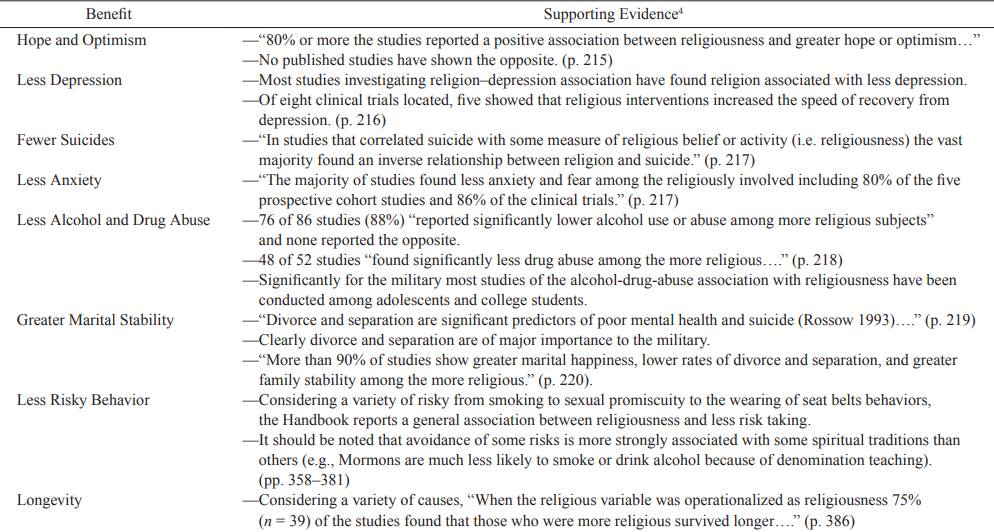
From a less academic standpoint but more realistic standpoint, I have also written blog posts on the importance of spiritual fitness for combat readiness which describes why spiritual fitness is crucial to dealing with issues of death and taking life on the battlefield for military members in particular with the application for those in law enforcement.
Tactical Human Performance Becoming a Reality
Now that I’ve covered individual attributes of holistic fitness necessary for tactical athletes to be successful in operational settings, you might be wondering how it all gets put together. You are in good hands! Since 2015 I have been working on solutions to just that problem and have developed multiple concepts including leveraging partnerships with SEALFIT/Unbeatable Mind to get after tactical human performance. Most recently I have led the Freedom Fitness America team to develop a system called “Tactical Garage Gym” which utilizes the Beyond the Whiteboard app used in the CrossFit community with embedded fitness programming from Mountain Tactical Institute for tactical athletes. In addition to this, both secular and Christian content is embedded in this app to play during workouts for motivational and educational purposes. Furthermore, nutrition and personal fitness measurement tracking are involved in this training program. We also are launching an initiative as part of this program called “Garage Gym Church” where on Saturday mornings, we push out content through our Tactical Garage Gym Facebook Group and the Beyond the Whiteboard app regarding CrossFit Hero WOD Programming designed to be done in your garage gym with friends of yours who you can invite to a Christian educational session immediately following the WOD based on the content we offer. To learn more about this system, go to Freedom Fitness America Services Offered. I look forward to discussing more topics with you related to tactical human performance and lessons learned at the intersection of faith and fitness!
Fit for the Fight and Life,
Chris Reardon
Major, US Marine Corps
Founder/Executive Director
Freedom Fitness America
https://freedomfitnessamerica.org
Email: chris@freedomfitnessamerica.org
“The appearance of U.S. Department of Defense (DoD) visual information does not imply or constitute DoD endorsement.”
